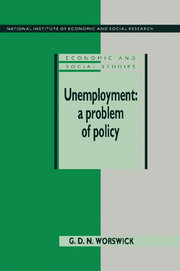Book contents
- Frontmatter
- Contents
- List of tables
- List of charts
- Preface
- 1 INTRODUCTION
- 2 CONCEPTS AND MEASUREMENTS
- PART 1 STRUCTURAL CHANGE
- PART 2 THE WAGE QUESTION
- 8 WAGES AND EMPLOYMENT
- 9 WAGE SUBSIDIES
- 10 PROFIT SHARING
- 11 INCOMES POLICY
- PART 3 MACROECONOMIC POLICY
- PART 4 INTERNATIONAL DIMENSION
- Appendix to Chapter 8: The puzzle of the apparent fall in United States real wages
- Notes
- List of works cited
- Index
- THE NATIONAL INSTITUTE OF ECONOMIC AND SOCIAL RESEARCH PUBLICATIONS IN PRINT
8 - WAGES AND EMPLOYMENT
from PART 2 - THE WAGE QUESTION
Published online by Cambridge University Press: 06 July 2010
- Frontmatter
- Contents
- List of tables
- List of charts
- Preface
- 1 INTRODUCTION
- 2 CONCEPTS AND MEASUREMENTS
- PART 1 STRUCTURAL CHANGE
- PART 2 THE WAGE QUESTION
- 8 WAGES AND EMPLOYMENT
- 9 WAGE SUBSIDIES
- 10 PROFIT SHARING
- 11 INCOMES POLICY
- PART 3 MACROECONOMIC POLICY
- PART 4 INTERNATIONAL DIMENSION
- Appendix to Chapter 8: The puzzle of the apparent fall in United States real wages
- Notes
- List of works cited
- Index
- THE NATIONAL INSTITUTE OF ECONOMIC AND SOCIAL RESEARCH PUBLICATIONS IN PRINT
Summary
INTRODUCTION
Do lower wages cause employment to rise, or does higher employment cause wages to rise? We can set up theoretical models which incorporate the causal link in either direction, or, indeed, in both. But it is economic history and the current real economic situation which tell us which is the direction of causality demanding the most attention at any particular time. In interwar Britain, it was the belief that unemployment was being caused by too high wages which was at the centre of controversy. After the Second World War, the emphasis was all the other way. There was no sign of a return of mass unemployment, and the question now being put was whether low levels of unemployment were causing wages to rise too fast, thereby generating inflation. After the mid-1970s unemployment began to reappear in Britain on a large scale, and the pendulum swung back towards high wages as a cause of unemployment, albeit this time the swing of the pendulum has not wholly extinguished worries about low unemployment causing inflation.
The swings of the pendulum occur mainly in response to changes in economic institutions and in the performance of the economy, but they also owe something to developments in economic theory, as may be seen from a brief examination of the three phases we have just outlined. Let us make it clear at the outset that we are talking about British experience and attitudes.
- Type
- Chapter
- Information
- Unemployment: A Problem of PolicyAnalysis of British Experience and Prospects, pp. 79 - 103Publisher: Cambridge University PressPrint publication year: 1991

